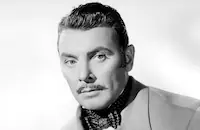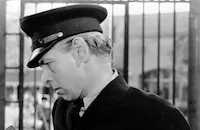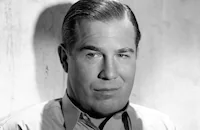Baby Face

Brief Synopsis
Cast & Crew
Alfred E. Green
Barbara Stanwyck
George Brent
Donald Cook
Alphonse Ethier
Henry Kolker
Film Details
Technical Specs

Synopsis
Although Lily Powers, the beautiful young daughter of Nick Powers, a steel town speakeasy owner, struggles to protect herself from men, her father forces them on her. Finally Lily rebels and, on the advice of her friend, the local cobbler, decides to use men to get ahead. She leaves the steel town and takes her maid Chico with her to the city, where she takes a job in a bank. There she seduces men like Jimmy McCoy, his boss Brody, and eventually Ned Stevens, Brody's supervisor. Stevens sets Lily up in an apartment, although he is engaged to Ann Carter, the daughter of one of the bank's executives. Then Ann's father discovers Lily's charm and provides her with an even more elegant apartment. In a jealous rage, Stevens kills Carter, then himself, creating a scandal at the bank. Lily claims she is a victim of circumstance, convincing the bank to pay her enough money to go to Paris and make a fresh start. A well-respected socialite named Courtland Trenholm is subsequently appointed president, and after he is transferred to Paris, he too falls in love with Lily and marries her. Trenholm signs over his fortune to Lily, and when the bank is faced with bankruptcy, Lily refuses to help him. Convinced he is ruined, Trenholm decides to shoot himself, but Lily arrives in time to save his life and promise her devotion to him. After she uses her jewels to pay back the money he owes, Lily and Trenholm move to the steel town to start over together.

Director
Alfred E. Green
Cast

Barbara Stanwyck

George Brent

Donald Cook

Alphonse Ethier

Henry Kolker

Margaret Lindsay

Arthur Hohl

John Wayne

Robert Barrat

Douglas Dumbrille
Theresa Harris
James Murray
Harry Gribbon
Arthur Dekuh

Nat Pendleton

Edward Van Sloan
Charles Coleman
Grace Hayle

Charles Sellon
Renee Whitney
Crew
Harry Akst
Howard Bretherton
Mark Canfield
Benny Davis
Leo F. Forbstein
Fred Fox
Oliver Garretson
Anton Grot
W. C. Handy
Gene Markey
Orry-kelly
Kathryn Scola
James Van Trees

Photo Collections
Videos
Movie Clip





Trailer
Hosted Intro
Film Details
Technical Specs

Articles
Baby Face
Baby Face, which ran into trouble with the MPPDA (Motion Picture Producers and Distributors of America) before the first cut was even screened, is set in a rough steel mill town. Lily, nicknamed "Baby Face," works for her father in his sordid speakeasy and is often forced to perform sexual favors for paying customers. When an exploding still kills her father, Lily grabs a freight train out of town before his body is even cold. Upon arriving in New York City, she sweet-talks her way into a job at a bank and quickly sleeps her way to the top (a very young John Wayne is one of her first conquests), eventually marrying the bank president, Trenholm (George Brent). Pretty soon, her husband is embezzling money from the bank to keep Lily in luxury.
While some feminist film historians have accused Baby Face of being the most exploitive of Stanwyck's early movies, it was a film in which she enjoyed a creative collaboration with producer Darryl F. Zanuck who penned the original story under the pseudonym Mark Canfield. For instance, it was her suggestion that Lily's father force her to have sex with several men. Of course, the New York censors rejected the movie entirely and Warner Brothers had to make numerous changes, reshooting several scenes and adding new ones. The original climax, in which Trenholm commits suicide because Lily won't sell her jewels to bail him out of his financial crisis, was dropped and replaced with a phony upbeat ending which is too absurd to lessen the impact of all that has gone before. A seduction scene involving a railroad braceman was also axed and an important dialogue scene with Lily's only male friend, a cynical German immigrant, was completely rewritten so that his advice, "You must use men, not let them use you" became a moralistic warning, "There is a right way and a wrong way - remember the price of the wrong way is too great." (In 2006, Warner Video released a version of Baby Face on DVD in their "Forbidden Hollywood Collection, Volume 1" which included the two previously deleted scenes mentioned above).
In the end, a revised Baby Face slid in under the wire before the revised Production Code went into effect and still managed to offend the sensibilities of certain critics and audience members. A reviewer for The New York Evening Post said "You cannot escape the belief that Lily is a vixen of the lowest order and that the men who play with her are doomed to perish in the flames." Regardless of how it was received in its day, Baby Face remains one of Stanwyck's most potent performances and a final hurrah in Pre-Code cinema.
Director: Alfred E. Green
Producer: Raymond Griffith
Screenplay: Gene Markey, Kathryn Scola
Cinematography: James Van Trees
Editor: Howard Bretherton
Art Direction: Anton Grot
Cast: Barbara Stanwyck (Lily "Baby Face" Powers), George Brent (Trenholm), Donald Cook (Stevens), Arthur Hohl (Sipple), Margaret Lindsay (Ann Carter), Arthur Hohl (Ed Sipple), John Wayne (Jimmy McCoy, Jr.).
BW-71m. Closed captioning.
by Jeff Stafford

Baby Face
Baby Face - Barbara Stanwyck stars in The-Daring-For-Its-Time BABY FACE - A 1933 Pre-Code Melodrama on DVD
"She used everything SHE had... to get everything MEN had," declared the posters, and the posters were right. Baby Face gives us Barbara Stanwyck as Lily, a barmaid in Erie, Penn., who's been pimped out by her father since she was a teenager. Finally leaving her putrid life, she lands in New York City, where she methodically and ruthlessly sleeps her way to the top of a banking empire - floor by floor, department by department, and man by man. That's the story in a nutshell, which incidentally was written by Warners' production head Darryl Zanuck (under the pseudonym Mark Canfield) with input from Stanwyck herself. What really pushed the limits of acceptability back in '33 was not just the manner of Lily's corporate ascent but the relish with which she undertakes it. In an early scene in Erie, she is encouraged by a Nietzsche-quoting local cobbler to "exploit" herself and "use men!" She sees this as the smart, right way for a woman to succeed, and we the audience are sympathetic to her because we can see that she's been raised by her own father to see men as nothing more than lowlife sex objects. Her plan for success seems sadly inevitable (not to mention deliciously entertaining!).
Baby Face was actually given a limited release in its original, longer form, in early April 1933. One theater's newspaper ad implored readers, "PARENTS: PLEASE DO NOT BRING YOUR CHILDREN!" The picture was banned outright by the New York state censorship board, and it proved so shocking elsewhere that it was quickly withdrawn altogether and ordered to be altered.
The stars were not available for retakes, however, so Warners carefully snipped out almost 30 separate bits of business or lines of dialogue, totaling about five minutes. Most of the changes merely toned down the explicitness or luridness of the given scenes. The implication of sex was still there; it had just been a little more obvious in the longer version. For example, in the uncensored version, Lily gets her first bank job by seducing a fat office boy, who follows her into a private room and closes the door. In the censored version, we fade out on the boy watching her go into the room, though the implication remains. In another example, an entire wordless sequence of a bank executive arriving at Lily's apartment one night and leaving the next morning was eliminated entirely, though the following scenes still make it clear they have been sleeping together. A scene of Lily's father accepting money from another man for Lily's services was removed, though it's still plain as day that the father is pimping her. Lily's dialogue that this has been happening "ever since I was fourteen" was also deleted.
The biggest problem, however, was the cobbler. His advice to Lily had to go. Production Code censor Joe Breen suggested changing him from an agent of encouragement to a "spokesman of morality" as a way of counterbalancing the otherwise sordid subject matter. Now, instead of quoting Nietzsche to push Lily towards success, he tells her, "There is a right way and a wrong way. Remember the price of the wrong way is too great." That's the version we've heard for the past 73 years, even though it has always been obvious that the dialogue was dubbed in. In a later scene, Lily was originally shown receiving a book by Nietzsche as a Christmas present from the cobbler, with underlined passages reminding her to press on with her ruthless ways. In the re-cut version, a new insert changes the book to Stanley's Christian Institutions with a letter inside, from the cobbler, telling her that she is on the wrong path and expressing utter disappointment in her sinfulness.
The only major scene to be shot anew for the censored version was the ending, wherein the bank's board of directors reveal what has become of Lily and her bank president husband. It's always seemed ridiculously absurd. The original ending, now restored, is still a bit of a cop-out but is certainly not as jarring or unbelievable.
Three months after the initial release, Baby Face went to theaters again. The reaction wasn't much better. "Unsavory," said The New York Times. "Blue and nothing else," declared Variety. "Anything hotter than this for public showing would call for an asbestos audience blanket." The new version was edited down even more by regional censorship boards and was banned outright in Virginia and Ohio, as well as in Quebec, Australia and Switzerland. Commenting on the new re-release in 2006, The New York Times said, "Baby Face remains one of the most stunningly sordid films ever made. With its five full minutes of sleaze restored, it has to be seen to be not quite believed."
That Baby Face survived at all is fortunate. Things could have been much worse. A film called Convention City (1933), starring Joan Blondell and Dick Powell, came out the same year and was deemed so offensive that Jack Warner eventually ordered all known prints and the negative to be destroyed. That picture is now considered lost. Films like these led to a much heavier enforcement of the Production Code, and by mid-1934, the party was basically over.
Aside from the two versions of Baby Face, Forbidden Hollywood Collection Vol. 1 also includes Red-Headed Woman (1932) and Waterloo Bridge (1931). There are no major extras - just an introduction by TCM's Robert Osbourne and a trailer for Baby Face which, interestingly enough, includes a few lines from the uncensored version (most noticeably Stanwyck's "ever since I was fourteen"). Technically, the uncensored version looks better, probably because the negative was in better condition for not having had many prints struck from it. Both versions suffer from some scratches and blemishes, though nothing major. The discs are mislabeled, with the two versions of Baby Face on Disc 1, and the other titles on Disc 2.
In all, this is an excellent, entertaining movie, and comparing the two versions is tremendously interesting. This DVD is one of the most notable of 2006 and belongs on every collector's shelf.
For more information about Baby Face, visit Warner Video. To order Baby Face, go to TCM Shopping.
by Jeremy Arnold
(Special thanks to film historian Richard Bann for some of the factual information in this review.)
Baby Face - Barbara Stanwyck stars in The-Daring-For-Its-Time BABY FACE - A 1933 Pre-Code Melodrama on DVD
Baby Face - The Restored Version
Lily (Stanwyck) opens the movie by leaving home, which is actually her father's speakeasy. Although none of this is explicitly spelled out, it's clear that her dad has been selling her "services" since she was 14, as part of the entertainment at the bar. Before she leaves town, she visits friend-of-the-family Mr. Cragg, who gives her a book by Nietzsche. His advice to her is to "use men. Use men to get things you want."
It is advice that she follows closely. She lands in Manhattan at the entrance to a bank building. A little smile gets her in the door. A little more gets her a job. From there, she sleeps her way to the top -- literally. Each promotion lands her on a higher floor in the building. After only seven affairs (including one with a very young John Wayne), she is on the top floor with the president of the bank.
At the top, Lily is caught in a scandal involving the bank president and a jealous lover. She is ready to sell her story to the tabloids, and the bank is ready to pay her more to keep it to herself, but she opts instead for a quiet job in the Paris office. Maybe our nihilistic gold-digger has found a conscience that the Hays office could approve of.
The reason you can see Baby Face these days is that a rare print was found recently. It had footage that had not been seen in the last 70 years.
As Film Buff Online reports, "The new version was discovered by Mike Mashon, curator at the Motion Picture Division of the Library of Congress....Upon screening this new version, Mashon realized that this longer version contained many racier scenes that were eventually toned down for release."
You can see both versions of these scenes in the film now playing around the country (the re-shot scenes are included after the end of the film, so stick around). One shows Mr. Cragg softening his speech somewhat. In the reshoot, he counsels Lily to use men, but not to overdo it, and not to be evil. A later scene, where Cragg had sent her another Nietzsche book urging her to keep being ruthless, now shows a note inside the book urging her to be good. There is also a new ending, in which the bank's directors explain that Lily learned her lesson, paid her debt to society, and is happily living a humble little life back home.
If I were watching the existing version of Baby Face on Turner Classic Movies, I would have guessed that it was a pre-code drama. I'd have liked the risks it took and Stanwyck's gritty, determined performance. I probably would have disliked the out-of-character ending, and possibly forgotten the film. It's a good movie with interesting characters, but it's not one of the greats.
But seeing it at the theater is a real treat. First, it is projected, on film. That's a quality you can't match in your living room, even with a big screen and HDTV. And while the print isn't pristine (there are some scratches and dirt), the tonal range is excellent. Second, this is the pre-release version of the film, the version that was too much for New York censors and that Warner Brothers had to re-edit in 1933. It's a minor thrill to see this forbidden fruit that nobody has seen for 70 years.
Eventually, you'll be able to see Baby Face "uncensored" on DVD (and on TCM, of course), but not for another year. For now, the only way to see it is by going to your local art house.
by Marty Mapes
Baby Face - The Restored Version
Quotes
Trivia
Originally banned across the US due to its sexual innuendo.
Notes
According to Warner Bros. production records in the AMPAS Library file on the film, Baby Face was shot in eighteen days at a total cost of $187,000. MPAA/PCA records indicate that the film met with censorship problems shortly after its initial release. The Hays office recommended that the picture be pulled from the theaters for its violations of the production code. According to PCA files at AMPAS, there was extensive correspondence between officials of the AMPP and Warner Bros. executives Darryl Zanuck and Jack L. Warner regarding various changes which were intended to make the film more acceptable to censor boards across the country. The main thrust of the changes was to attach an ending which showed Lily losing everything she had gained and returning to her hometown in order that viewers would not be tempted to believe that vice was rewarded. Originally the character of the cobbler professed a Nietzchian philosophy which was unacceptable under the production code. The character was changed to become instead the moral voice of the film, and was used to indicate that the character of Lily had been wrong to advance in the by using her body. Also cut were the most blantant references to the fact that Lily was being kept by men. Film Daily notes that the film was rejected by the Virginia censor board. Although some reviews indicate that this film led to a rift between Zanuck and Warner Bros., resulting in his departure and eventually the formation of Twentieth Century Pictures, actually Zanuck quit over a labor despute. For additional information on Zanuck's departure from Warner Bros., consult the entry below for the The Bowery.

Miscellaneous Notes
Released in United States 1933
Released in United States 1999
Released in United States 1999 (Shown in New York City (Film Forum) as part of program "The Joy of Pre-Code: Sex, Booze and Red Hot Jazz, 1930-1933" August 20 - September 14, 1999.)
Released in United States 1933
















